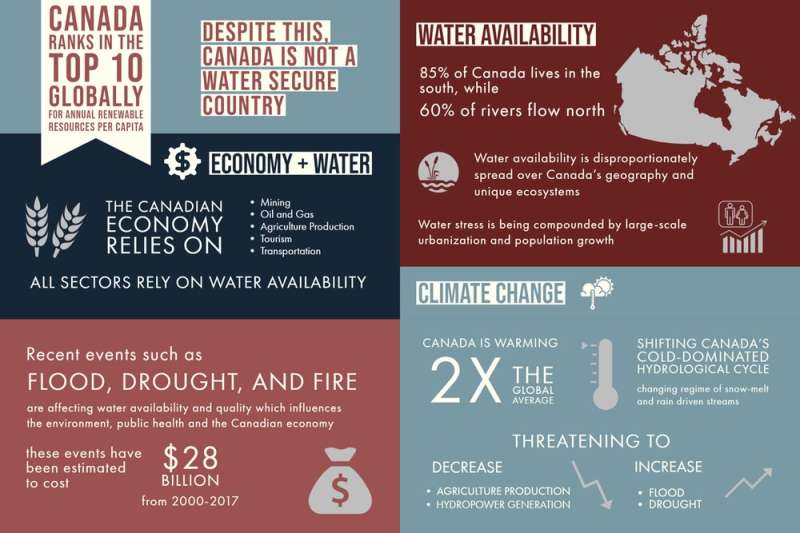Climate change, pollution and urbanization threaten water in Canada

In recent years, the daily news has been flooded with stories of water woes from coast to coast to coast.
There are and lead in drinking water in the older neighbourhoods of many cities in Canada. We see toxic blue green algae and as well as catastrophic , and .
In 2018, parts of British Columbia experienced .
Our water resources are under threat from contamination, land use, urbanization and . If we're not careful, it may not be clean enough or available when we need it.
An opportunity to lead
The public supports environmental—and water—leadership in Canada. Many political pundits have suggested the federal election result of October 2019 was a .
And yet Canada is on the front lines of that affect the water cycle. Where, when, and how much rain, snow or freezing rain falls is changing across Canada.
This is the water that we depend upon to replenish our groundwater, rivers and lakes, which continue to have a significant and increasing impact on water availability and quality in Canada and around the world.
However, Canadians remain divided on energy policy and resource development, and on appropriate solutions that balance environmental, economic and social needs. As Canadians, we must move beyond this and implement changes to better manage our water resources sustainably.
Water front and center
We must manage our water sustainably because water is central to environmental, social and economic sustainability and therefore sustainable societies. This is the focus of the . These 17 goals identify targets that must be achieved for livelihoods, health, education, environment, cities, oceans, equity and partnership.
It's important to understand that these goals are not isolated, but interrelated. This is why, even though there is a goal for water (), there are 40 targets in the other 16 goals that relate directly to water.
For example, we cannot have good health if we do not have clean and accessible water, and children cannot go to school or adults to work, if they are not healthy. With water often at the heart of many social and economic inequities, it is critical to address water quantity, quality and access issues in order to meet all of the goals and to achieve the global sustainable development vision.
in a sustainable and equitable manner requires all of us to urgently recognize our changing climate and water resources, including drinking water, and act appropriately.
It requires federal co-ordination and leadership on water to overcome challenges of fragmented jurisdiction, such as following through with their commitment to create a , develop a and ensure universal access to adequate drinking water supplies.
Research institutions must also step up to advance our knowledge, develop and assess decision support tools and solutions, and communicate their findings to communities, governments and economic sectors.
Finally, it requires reconciliation through shared nations' governance of water resources and recognition of the and .
Getting our own house in order
Canada could support the world in achieving water sustainability, but it must first get its own house in order and achieve the UN's water goals nationally.
Canada still has not reached universal access to reliable, potable water supplies for everyone, especially . Lead pipes, disinfection byproducts and aging infrastructure are interrupting drinking water service and negatively affecting human health.
These water threats also cost our economy big time—as much as —and those .
The bottom line
Canada already has the expertise, technologies, industries and research capacity to make good on a commitment to water sustainability and universal achievement of the UN's water goals for all Canadians. But it needs leadership to advance research and practice to expand our existing strengths, and export these internationally.
Canadian research institutions have a role to play in bringing the country together by showing Canada and the world the solutions and benefits of achieving these goals.
There are significant long-term benefits at stake, including the enhanced health and well-being of current and future generations, as well as expanded economic opportunity. But, to achieve these, political leadership needs to transcend partisan lines in order to do what is right.
Ultimately, we have an opportunity to make where we live a better place and to get our own watersheds in order. This will help us create a better, more just, equitable and sustainable world for all. The alternative is, quite simply, unthinkable.
Provided by The Conversation
This article is republished from under a Creative Commons license. Read the .![]()




















